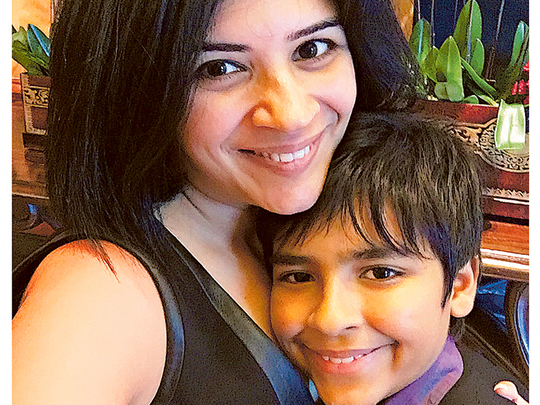
Dubai: A Dubai mum has urged parents to supervise their children’s social media activity after her 11-year-old son was left terrified by a death threat on WhatsApp.
Indian expat Harshika Daryanani, who is a Dubai-based blogger, said one Friday morning in May she woke up to her son screaming and banging on her bedroom door.
Her son, called J affectionately, had received a WhatsApp message from a certain Teresa Fidalgo threatening to kill him in his room the next time he goes to sleep.
J googled Teresa Fidalgo — as stressed in the message if he didn’t believe the threat — and was horrified by the results.
Teresa Fidalgo is an urban legend and a chain message doing the rounds on social media for years, whose search results sometimes show bloodied pictures. It is purportedly from the ghost of a young girl who died in a car crash, who wants people to forward her story, failing which death overtakes the receiver or his family within weeks.
Variants of the message and story are rife on Facebook, WhatsApp, Instagram and email accounts.
Daryanani has shared the incident with Gulf News after blogging about it last month in a bid to urge parents to keep a close eye on the children’s online lives. She said it was inevitable that children will start going online from a younger age, with or without their parent’s knowledge.
“We don’t live in a time where we don’t give our children a phone any more. My son, for example, has been using an iPad at school for three years. I can’t stop him. But what we, as parents, can do is manage it. Lay down the rules. That’s so important,” she said.
Daryanani added that it was crucial that parents and children have an “open and comfortable” discussion about the use of mobile phones and internet access.
“J shared with me what happened to him. But many kids don’t tell their parents about it. You have to have a relationship where they are comfortable enough to talk to you.”
At the same time, she added, parents can take some steps to supervise children online.
“[For example] I’m on J’s friends’ list in all his accounts, just to keep an eye on what’s going on. It’s not snooping. [And] certain apps I will only let him use from my phone, and he’s not allowed to approve random friend requests,” Daryanani said.
She also advised parents to candidly discuss some sensitive issues — such as doping by athletes — with their children so they don’t feel the need to explore it online, where content is often not suitable for them.
“It’s better you tell your child because they are going to look it up. It’s a reality, kids are smart.”
Right after May’s “creepy” message, which had left them “freaked out”, Daryanani had called Dubai Police to report the incident but since J had deleted the message from his account, it was not possible to trace the sender. However, the police still followed up with J and counselled him, which helped allay J’s fears and made his feel safe, she added.
“I know it’s a prank, and I am an adult. And I was scared! J is OK now,” she said.
Daryanani’s blog can be viewed on www.onlyonewaytofindout.com/
Protecting children online
1. Lay out some ground rules. For example, you can start by telling that anything shared once on the internet stays there forever and that nothing is 100 per cent private.
2. Tell them to check with you. First tell your child what “personal information” means. Draw up a list for them and tell them clearly that they should always consult with you before sharing those details with any website or person on the internet.
3. Curb social media use. If you want to take an extra step in securing your child’s online privacy, create fake social media names for them and a fake school/city name.
4. Install a VPN. Virtual Private Networks creates a connection tunnel that automatically encrypts all the data coming in and out of your device, and effectively protects anyone using the internet.
5. Communication with strangers. Under no circumstances should they share any pictures, addresses, etc.
Source: NordVPN, a leading advanced VPN provider








